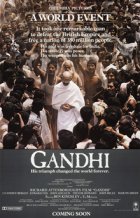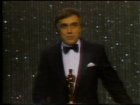
Gandhi Page #3
- PG
- Year:
- 1982
- 191 min
- 1,857 Views
The camera picks out those who ride on the weapon-carrier
with Gandhi's body... the stout, blunt, but now shattered
Patel, Gandhi's son, Devadas, the strong, almost fierce face
of Maulana Azad, now angry at the Gods themselves... and
finally Pandit Nehru -- a face with the strength of a hero,
the sensitivity of a poet, and now wounded like the son of a
loving father.
MURROW'S VOICE-OVER
... but perhaps to this man of peace,
to this fighter who fought without
malice or falsehood or hate, the
tribute he would value most has come
from General Douglas McArthur: "If
civilization is to survive," the
General said this morning, "all men
cannot fail to adopt Gandhi's belief
that the use of force to resolve
conflict is not only wrong but
contains within itself the germ of
our own self-destruction."...
A news truck is parked in the mass of the crowd. As the
cortege nears, the photographers on it stand to snap their
pictures. There is a newsreel crew center. The camera features
a woman photographer (Margaret Bourke-White) who sits with
her legs dangling over the side of the truck, her famous
camera held loosely in her hand, un-regarded, as she watches
the body of Gandhi approach. The intelligent features are
betrayed by the emotion in her eyes. For an instant we see
Gandhi from her point of view, and read the personal impact
it has on her.
MURROW'S VOICE-OVER
Perhaps for the rest of us, the most
satisfying comment on this tragedy
comes from the impudent New York PM
which today wrote, "There is still
hope for a world which reacts as
reverently as ours has to the death
of a man like Gandhi."...
The camera is high and we see the cortege from the rear,
moving off down the vast esplanade, its narrowing path parting
the sea of humanity like a long trail across a weaving
plain... and as the shuffling sound of sandalled feet fades
in the distance we dissolve through to
RAILROAD - SOUTH AFRICA - EXTERIOR - NIGHT
With the camera high we see a railroad track stretching out
across a darkly verdant plain, and suddenly the whistle of a
train as its engine and light sweep under the camera,
startling us as it sweeps across the moonlit landscape.
Tracking with the train. We begin at the guard's van, dwelling
for a moment on the words "South African Railways," then
pass on to the dimly lit Third Class coaches in the rear of
the train, moving past the crowded Blacks and Indians in the
spare wooden accommodation... There are two or three such
coaches, then a Second Class coach... cushioned seats, better
lighting, a smattering of Europeans: farmers, clerks, young
families. Their clothes indicate the date: the early 1890s.
The conductor is working his way through this coach, checking
tickets... The track continues to the First Class coach --
linen over the seats, well-lit luxurious compartments. We
pass a single European, and then come to rest on the back of
a young Indian dressed in a rather dandified Victorian attire,
and reading as a Black porter stows his luggage.
FIRST CLASS COACH - SOUTH AFRICAN RAILWAYS - INTERIOR -
NIGHT:
Featuring the young Indian. It is the young Gandhi -- a full
head of hair, a somewhat sensuous face, only the eyes help
us to identify him as the man we saw at Birla House, the
figure on the bier in Delhi. He is lost in his book and there
is a slight smile on his face as though what he reads
intrigues and surprises him. He grins suddenly at some
insight, then looks out of the window, weighing the idea.
As he does the European passes the compartment and stops
dead on seeing an Indian face in the First Class section.
The porter glances at the European nervously. Gandhi pivots
to the porter, holding his place in the book, missing the
European, who has moved on down the corridor, altogether. We
see the cover of the book: The Kingdom of God is Within You,
by Leo Tolstoy.
GANDHI:
Tell me -- do you think about hell?
PORTER:
(stares at him blankly)
"Hell!"
GANDHI:
(the eternal, earnest
sophomore)
No -- neither do I. But...
(he points abruptly
to the book)
but this man is a Christian and he
has written --
The porter has glanced down the corridor, where from his
point of view we can just glimpse the European talking with
the conductor.
PORTER:
Excuse me, baas, but how long have
you been in South Africa?
GANDHI:
(puzzled)
A -- a week.
PORTER:
Well, I don't know how you got a
ticket for --
He looks up suddenly then turns back quickly to his work.
Gandhi glances at the door to see what has frightened him
so.
Translation
Translate and read this script in other languages:
Select another language:
- - Select -
- 简体中文 (Chinese - Simplified)
- 繁體中文 (Chinese - Traditional)
- Español (Spanish)
- Esperanto (Esperanto)
- 日本語 (Japanese)
- Português (Portuguese)
- Deutsch (German)
- العربية (Arabic)
- Français (French)
- Русский (Russian)
- ಕನ್ನಡ (Kannada)
- 한국어 (Korean)
- עברית (Hebrew)
- Gaeilge (Irish)
- Українська (Ukrainian)
- اردو (Urdu)
- Magyar (Hungarian)
- मानक हिन्दी (Hindi)
- Indonesia (Indonesian)
- Italiano (Italian)
- தமிழ் (Tamil)
- Türkçe (Turkish)
- తెలుగు (Telugu)
- ภาษาไทย (Thai)
- Tiếng Việt (Vietnamese)
- Čeština (Czech)
- Polski (Polish)
- Bahasa Indonesia (Indonesian)
- Românește (Romanian)
- Nederlands (Dutch)
- Ελληνικά (Greek)
- Latinum (Latin)
- Svenska (Swedish)
- Dansk (Danish)
- Suomi (Finnish)
- فارسی (Persian)
- ייִדיש (Yiddish)
- հայերեն (Armenian)
- Norsk (Norwegian)
- English (English)
Citation
Use the citation below to add this screenplay to your bibliography:
Style:MLAChicagoAPA
"Gandhi" Scripts.com. STANDS4 LLC, 2025. Web. 22 Feb. 2025. <https://www.scripts.com/script/gandhi_471>.







Discuss this script with the community:
Report Comment
We're doing our best to make sure our content is useful, accurate and safe.
If by any chance you spot an inappropriate comment while navigating through our website please use this form to let us know, and we'll take care of it shortly.
Attachment
You need to be logged in to favorite.
Log In